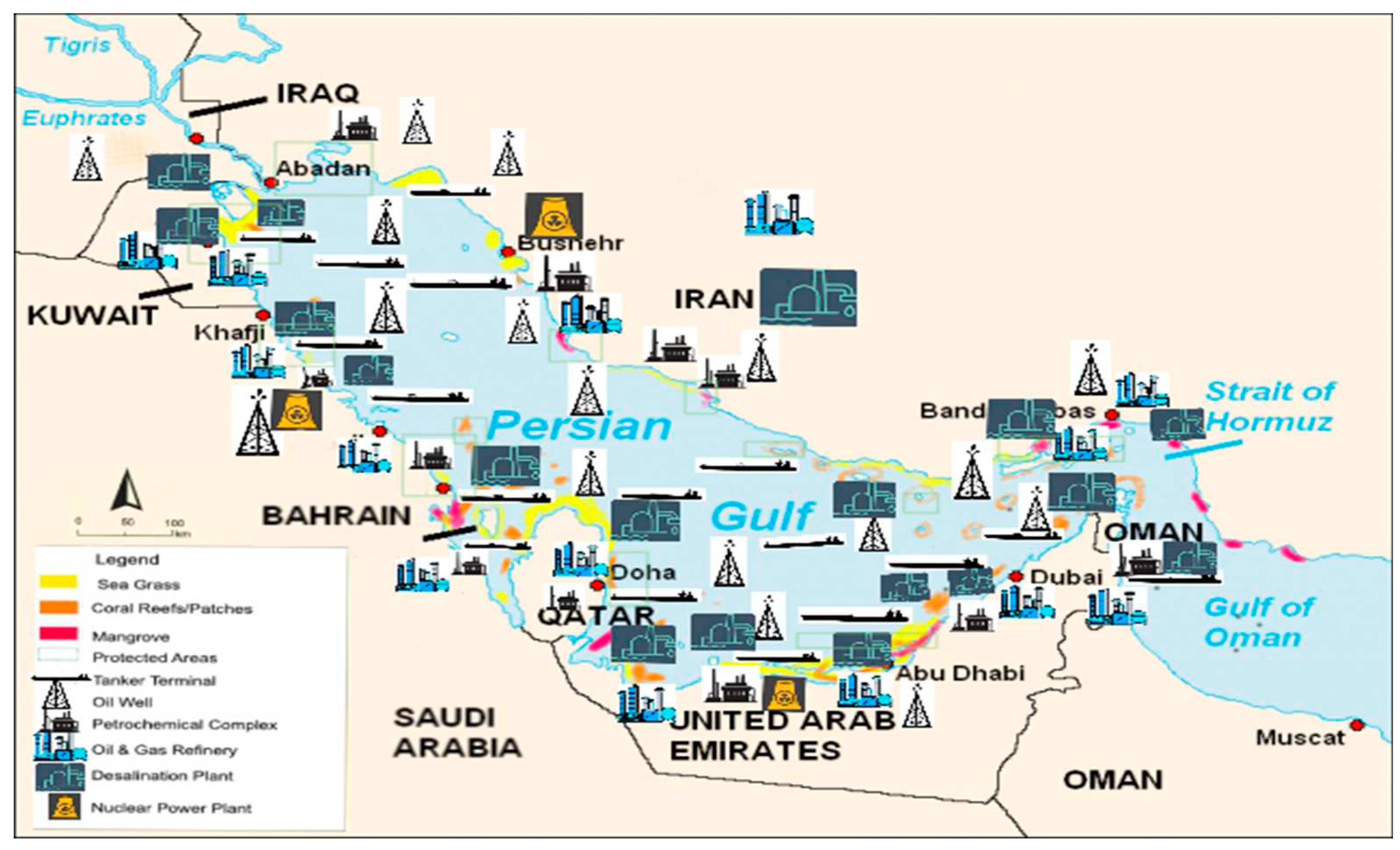Submitted:
01 September 2023
Posted:
04 September 2023
You are already at the latest version
Abstract
Keywords:
1. Introduction
2. Population
2. Data source and analysis
3. Environmental Framework
3.1. Climate of the Region
3.2. Annual Percipitation
4. Energy
5. Carbon dioxide emission
6. Examining the subsidy provided to fossil fuels in PGR
4. Discussion and future directions
4. Conclusion
- Implement a transition from high-carbon fossil fuels to low-carbon alternatives, coupled with emission reduction strategies such as CO2 sequestration (capturing and storing carbon from fossil fuels or the atmosphere).
- The existing oil and gas policies pursued by nations in the Persian Gulf predominantly concentrate on augmenting energy production capacity, resulting in consumption-oriented and unsustainable approaches. Evaluating energy consumption patterns in recent years reveals inefficient and ineffectual energy usage. Furthermore, these countries frequently neglect to regard energy prices as indicative of economic expenses. As a result, subsidy reform becomes an essential policy instrument for these nations to encourage energy conservation and foster sustainability.
- The countries in the Persian Gulf region should strengthen their initiatives to reduce carbon emissions by implementing a carbon taxation system that holds companies accountable for the amount of carbon they emit into the air.
Funding
Institutional Review Board Statement
Informed Consent Statement
Conflicts of Interest
References
- Yu, Z.; Yao, Y.; Yang, G.; Wang, X.; Vejre, H. Spatiotemporal patterns and characteristics of remotely sensed region heat islands during the rapid urbanization (1995–2015) of Southern China. Sci. Total. Environ. 2019, 674, 242–254. [Google Scholar] [CrossRef]
- https://www.worldbank.org/en/news/feature/2021/12/16/2021-the-year-in-climate-in-5-numbers. 2021.
- Wong, K.V.; Paddon, A.; Jimenez, A. Review of World Urban Heat Islands: Many Linked to Increased Mortality. J. Energy Resour. Technol. 2013, 135, 022101. [Google Scholar] [CrossRef]
- Aflaki, A.; Mirnezhad, M.; Ghaffarianhoseini, A.; Ghaffarianhoseini, A.; Omrany, H.; Wang, Z.-H.; Akbari, H. Urban heat island mitigation strategies: A state-of-the-art review on Kuala Lumpur, Singapore and Hong Kong. Cities 2017, 62, 131–145. [Google Scholar] [CrossRef]
- Li, G.; Zhang, X.; Mirzaei, P.A.; Zhang, J.; Zhao, Z. Urban heat island effect of a typical valley city in China: Responds to the global warming and rapid urbanization. Sustain. Cities Soc. 2018, 38, 736–745. [Google Scholar] [CrossRef]
- Beni, A.N.; Marriner, N.; Sharifi, A.; Azizpour, J.; Kabiri, K.; Djamali, M.; Kirman, A. Climate change: A driver of future conflicts in the Persian Gulf Region? Heliyon 2021, 7, e06288. [Google Scholar] [CrossRef] [PubMed]
- Zhang, X.; Aguilar, E.; Sensoy, S.; Melkonyan, H.; Tagiyeva, U.; Ahmed, N.; Kutaladze, N.; Rahimzadeh, F.; Taghipour, A.; Hantosh, T.H.; et al. Trends in Middle East climate extreme indices from 1950 to 2003. J. Geophys. Res. Earth Surf. 2005, 110. [Google Scholar] [CrossRef]
- Nasrallah, H.A.; Nieplova, E.; Ramadan, E. Warm season extreme temperature events in Kuwait. J. Arid. Environ. 2004, 56, 357–371. [Google Scholar] [CrossRef]
- J. Simmons, P. J. Simmons, P. Berrisford, D. P. Dee, H. Hersbach, S. Hirahara, and J.-N. The ́paut, “A reassessment of temper- ature variations and trends from global reanalyses and monthly surface climatological datasets,” Quarterly Journal of the Royal Meteorological Society, 2017, vol. 143, no. 702, pp. 101–119.
- Hansen, J.E.; Ruedy, R.; Sato, M.; Lo, K. Global surface temperature change. Rev. Geophys. 2010, 48, RG4004. [Google Scholar] [CrossRef]
- Pal, J.S.; Eltahir, E.A.B. Future temperature in southwest Asia projected to exceed a threshold for human adaptability. Nat. Clim. Chang. 2015, 6, 197–200. [Google Scholar] [CrossRef]
- Lazoglou, G.; Anagnostopoulou, C.; Tolika, K.; Kolyva-Machera, F. A review of statistical methods to analyze extreme precipitation and temperature events in the Mediterranean region. Theor. Appl. Clim. 2018, 136, 99–117. [Google Scholar] [CrossRef]
- Tavakol, A.; Rahmani, V.; Harrington, J. Evaluation of hot temperature extremes and heat waves in the Mississippi River Basin. Atmospheric Res. 2020, 239, 104907. [Google Scholar] [CrossRef]
- M. J. Islam, M. J. M. J. Islam, M. J. Slater, M. Bo ̈gner, S. Zeytin, and A. Kunzmann, “Extreme ambient temperature effects in European seabass, Dicentrarchus labrax: growth performance and hemato-biochemical parameters,” Aquaculture 2020, vol. 522,.
- D. Luca, R. D. Luca, R. El ́ıa, M. Bador, and D. Argu ̈eso, “Contribution of mean climate to hot temperature extremes for present and future climates,” Weather and Climate Extremes 2020 vol. 28, Article ID 100255.
- Lelieveld, J.; Proestos, Y.; Hadjinicolaou, P.; Tanarhte, M.; Tyrlis, E.; Zittis, G. Strongly increasing heat extremes in the Middle East and North Africa (MENA) in the 21st century. Clim. Chang. 2016, 137, 245–260. [Google Scholar] [CrossRef]
- F. Abdulla, “21st century climate change projections of pre- cipitation and temperature in Jordan,” Procedia Manufacturing, 2020 vol. 44, pp. 197–204.
- S. Alghamdi and T. W. Moore, “Analysis and comparison of trends in extreme temperature indices in Riyadh city, kingdom of Saudi Arabia, 1985–2010,” Journal of Climatology,2014, Article ID 560985, 10 pages.
- Habib, R.R.; El Zein, K.; Ghanawi, J. Climate Change and Health Research in the Eastern Mediterranean Region. EcoHealth 2010, 7, 156–175. [Google Scholar] [CrossRef]
- Ahmadalipour, A.; Moradkhani, H. Escalating heat-stress mortality risk due to global warming in the Middle East and North Africa (MENA). Environ. Int. 2018, 117, 215–225. [Google Scholar] [CrossRef]
- Constantinidou, K.; Hadjinicolaou, P.; Zittis, G.; Lelieveld, J. Effects of climate change on the yield of winter wheat in the eastern Mediterranean and Middle East. Clim. Res. 2016, 69, 129–141. [Google Scholar] [CrossRef]
- Zachariadis, T.; Hadjinicolaou, P. The effect of climate change on electricity needs – A case study from Mediterranean Europe. Energy 2014, 76, 899–910. [Google Scholar] [CrossRef]
- Lange, M.A. Impacts of Climate Change on the Eastern Mediterranean and the Middle East and North Africa Region and the Water–Energy Nexus. Atmosphere 2019, 10, 455. [Google Scholar] [CrossRef]
- Jiang, L. & O”Neill, B. C. Global urbanization projections for the shared socio- economic. Pathw. Glob. Environ. Chang 2017. 42, 193–199.
- Abulibdeh, A. Analysis of urban heat island characteristics and mitigation strategies for eight arid and semi-arid gulf region cities. Environ. Earth Sci. 2021, 80, 1–26. [Google Scholar] [CrossRef]
- Ahmadi M, Soofiabadi M, Nikpour M. , …, and Arandian B. Developing a Deep Neural Network with Fuzzy Wavelets and Integrating an Inline PSO to Predict Energy Consumption Patterns in Urban Buildings. Mathematics 2022, 10, 1270.
- Ozturk, H.K.; Ceylan, H.; Canyurt, O.E.; Hepbasli, A. Electricity estimation using genetic algorithm approach: a case study of Turkey. Energy 2005, 30, 1003–1012. [Google Scholar] [CrossRef]
- Köne, A. .; Büke, T. Forecasting of CO2 emissions from fuel combustion using trend analysis. Renew. Sustain. Energy Rev. 2010, 14, 2906–2915. [Google Scholar] [CrossRef]
- Ramanathan, R. An analysis of energy consumption and carbon dioxide emissions in countries of the Middle East and North Africa. Energy 2005. [Google Scholar] [CrossRef]
- Qader, M.R. Electricity Consumption and GHG Emissions in GCC Countries. Energies 2009, 2, 1201–1213. [Google Scholar] [CrossRef]
- Hdom, H.A.D. Examining carbon dioxide emissions, fossil & renewable electricity generation and economic growth: Evidence from a panel of South American countries. Renew. Energy 2019, 139, 186–197. [Google Scholar] [CrossRef]
- Ridhosari, B,. Rahman, A,. Carbon footprint assessment at Uni- versitas Pertamina from the scope of electricity, transportation, and waste generation: toward a green campus and promotion of environmental sustainability. 1: Clean Prod 2020, 246, 2020.
- Liddle B, Sadorsky P. How much does increasing non-fossil fuels in electricity generation reduce carbon dioxide emissions Appl.Energy 2017. 2: 197.
- Barthel, P.-A. Arab Mega-Projects: Between the Dubai Effect, Global Crisis, Social Mobilization and a Sustainable Shift. Built Environ. 2010, 36, 133–145. [Google Scholar] [CrossRef]
- Bartlett, M. S. Coupled carbon and water fluxes in CAM photosynthesis: Modeling quantification of water use efficiency andproductivity,Plant Soil 2014,383(1–2), 111–138.
- Mirasgedis, S.; Sarafidis, Y.; Georgopoulou, E.; Lalas, D. The role of renewable energy sources within the framework of the Kyoto Protocol: the case of Greece. Renew. Sustain. Energy Rev. 2002, 6, 247–269. [Google Scholar] [CrossRef]
- Asif, M.; Muneer, T. Energy supply, its demand and security issues for developed and emerging economies. Renew. Sustain. Energy Rev. 2007, 11, 1388–1413. [Google Scholar] [CrossRef]
- Aryanpur, V.; Ghahremani, M.; Mamipour, S.; Fattahi, M.; Gallachóir, B.Ó.; Bazilian, M.D.; Glynn, J. Ex-post analysis of energy subsidy removal through integrated energy systems modelling. Renew. Sustain. Energy Rev 2022, 158, 112116. [Google Scholar] [CrossRef]
- Solaymani, S. Energy subsidy reform evaluation research – reviews in Iran. Greenh. Gases: Sci. Technol. 2021, 11, 520–538. [Google Scholar] [CrossRef]
- Solaymani, S. A Review on Energy and Renewable Energy Policies in Iran. Sustainability 2021, 13, 7328. [Google Scholar] [CrossRef]
- Ouyang, X.; Lin, B. Impacts of increasing renewable energy subsidies and phasing out fossil fuel subsidies in China. Renew. Sustain. Energy Rev. 2014, 37, 933–942. [Google Scholar] [CrossRef]
- IEA. World Energy Outlook 2017 Executive Summary; Energy Policy; IEA: Paris, France, 2017; pp. 90024–4. [Google Scholar]
- OECD. Improving the Environment through Reducing Subsidies; Organisation for Economic Cooperation and Development: Paris, France, 1999; Volume 1. [Google Scholar]
- OECD. Reforming Energy and Transport Subsidies: Environmental and Economic Implications; Organisation for Economic Cooperation and Development: Paris, France, 1997.44. Hamdi H, Sbia R, Shahbaz M. The nexus between electric- ity consumption and economic growth in Bahrain. Econ Model 2014, 38:227–237. [Google Scholar]
- Burniaux, J.-M.; Martin, J.P.; Oliveira-Martins, J. The Effect of Existing Distortions in Energy Markets on the Costs of Policies to Reduce CO2 Emissions: Evidence from GREEN; the Economic Costs of Reducing CO2 Emissions (OECD Economic Studies No 19); Organisation for Economic Cooperation and Development: Paris, France, 1992. [Google Scholar]
- Al-Marri, W.; Al-Habaibeh, A.; Watkins, M. An investigation into domestic energy consumption behaviour and public awareness of renewable energy in Qatar. Sustain. Cities Soc. 2018, 41, 639–646. [Google Scholar] [CrossRef]
- Fatourehchi, D.; Noguchi, M.; Doloi, H. Iranian Household Electricity Use Compared to Selected Countries. Encyclopedia 2022, 2, 1637–1665. [Google Scholar] [CrossRef]
- Verme, P. Subsidy Reforms in the Middle East and North Africa region: A review. In The Quest for Subsidy Reforms in the Middle East and North Africa Region; Springer: Cham, Switzerland, 2017; pp. 3–31. [Google Scholar]
- Moerenhout, T.; Irschlinger, T. Exploring the Trade Impacts of Fossil Fuel Subsidies; International Institute for Sustainable Development: Winnipeg, MB, Canada, 2020. [Google Scholar]
- Fattouh, B.; El-Katiri, L. Energy subsidies in the Middle East and North Africa. Energy Strat. Rev. 2013, 2, 108–115. [Google Scholar] [CrossRef]
- Wang, Q.; Qiu, H.-N.; Kuang, Y. Market-driven energy pricing necessary to ensure China's power supply. Energy Policy 2009, 37, 2498–2504. [Google Scholar] [CrossRef]
- Ahmad, M,. Chandio, AA,. Solangi, YA,. Shah, SAA,. Shahzad, F,. Rehman, A,. Jabeen, G. Dynamic interactive links among sustainable energy investment, air pollution, and sustainable development in regional China. 1: Environ Sci Pollut Res 2021, 28(2); 1502–1518.
- Burt, J.A.; Bartholomew, A. Towards more sustainable coastal development in the Arabian Gulf: Opportunities for ecological engineering in an urbanized seascape. Mar. Pollut. Bull. 2019, 142, 93–102. [Google Scholar] [CrossRef]
- Lelieveld, J. , Hadjinicolaou, P., Kostopoulou, E., Chenoweth, J., El Maayar, M., Giannakopoulos, C., et al. Climate change and impacts in the eastern mediterranean andthe Middle East. Climatic Change 2012, 114 (3-4), 667–687.
- Parry, M. , Parry, M.L., Canziani, O., Palutikof, J., Van der Linden, P., Hanson, C. Adaptation and Vulnerability: Working group II Contribution to the Fourth Assessment Report of the IPCC, 4. Cambridge University Press.Climate Change 2007.
- World Bank, 2019. Development Data. World Bank https://databank.worldbank.org/home.aspx.
- http://www.meteomanz.com.
- https://climateknowledgepo rtal.worldbank.org/region/middle-east/climate-data-historical.
- Briant, P. , 2006. From Cyrus to Alexander: A History of the Persian Empire. Eisenbrauns. Retrieved from: http://books.google.com/ books?id=lxQ9W6F1oSYC&pg=PA761.
- Teng, JZ,. Khan, MK,. Khan, MI,. Chishti, MZ,. Khan, MO,. Effect of foreign direct investment on CO 2 emission with the role of globalization, institutional quality with pooled mean group panel ARDL. Environmental Sci PollutRes 2020. 1–12.
- Nezlin, N.P.; Polikarpov, I.G.; Al-Yamani, F.Y.; Rao, D.S.; Ignatov, A.M. Satellite monitoring of climatic factors regulating phytoplankton variability in the Arabian (Persian) Gulf. J. Mar. Syst. 2010, 82, 47–60. [Google Scholar] [CrossRef]
- https://worldpopulationreview.com/continents/the-middle-east-population.
- Giannakopoulou, E.M.; Toumi, R. The Persian Gulf summertime low-level jet over sloping terrain. Q. J. R. Meteorol. Soc. 2011, 138, 145–157. [Google Scholar] [CrossRef]
- Prakash, P.J.; Stenchikov, G.; Kalenderski, S.; Osipov, S.; Bangalath, H. The impact of dust storms on the Arabian Peninsula and the Red Sea. Atmospheric Meas. Tech. 2015, 15, 199–222. [Google Scholar] [CrossRef]
- Frenken, K. Irrigation in the Middle East region in figures AQUASTAT Survey- 2008. Water Rep 2009. (34).
- Burt, J.A. The environmental costs of coastal urbanization in the Arabian Gulf. City 2014, 18, 760–770. [Google Scholar] [CrossRef]
- Sheppard, C.; Al-Husiani, M.; Al-Jamali, F.; Al-Yamani, F.; Baldwin, R.; Bishop, J.; Benzoni, F.; Dutrieux, E.; Dulvy, N.K.; Durvasula, S.R.V.; et al. The Gulf: A young sea in decline. Mar. Pollut. Bull. 2010, 60, 13–38. [Google Scholar] [CrossRef] [PubMed]
- Vaughan, G.O. , Al-Mansoori, N., Burt, J. The Arabian Gulf. In: Sheppard, C. (Ed.), World Seas: an Environmental Evaluation, second ed. Elsevier Science, Amsterdam, NL 2019, pp. pp1–23.
- International Energy Agency (IEA), Paris, France, 2020. Available online: https://www.iea.org (accessed on 15 July 2021).
- Ardemagni, E. Gulf Powers: Maritime Rivalry in the Western Indian Ocean. Baldwin-Edwards, M., 2005. Migration in the Middle East and Mediterranean: A Regional. 2018.
- Dawoud, M.A. Environmental Impacts of Seawater Desalination: Arabian Gulf Case Study. Int. J. Environ. Sustain. Dev. 2012, 1, 22–37. [Google Scholar] [CrossRef]
- World-Nuclear-Association, 2019. Nuclear Power in Iran. http://www.world-nuclear.org/information-library/country-profiles/countries-g-n/iran.aspx.
- Oryani, B.; Kamyab, H.; Moridiаn. ; Azizi, Z.; Rezania, S.; Chelliapan, S. Does structural change boost the energy demand in a fossil fuel-driven economy? New evidence from Iran. Energy 2022, 254. [Google Scholar] [CrossRef]
- Quadrelli, R.; Peterson, S. The energy–climate challenge: Recent trends in CO2 emissions from fuel combustion. Energy Policy 2007, 35, 5938–5952. [Google Scholar] [CrossRef]
- El-Katiri, L. A Roadmap for Renewable Energy in the Middle East and North Africa. 2014. [Google Scholar] [CrossRef]
- World Bank, 2010. Development and climate change. Washington, DC.: World Bank. Retrieved from: https://openknowledge. worldbank.org/handle/10986/4387. 1098.
- Air and GHG emissions. 2017. [CrossRef]
- Köne, A. .; Büke, T. Forecasting of CO2 emissions from fuel combustion using trend analysis. Renew. Sustain. Energy Rev. 2010, 14, 2906–2915. [Google Scholar] [CrossRef]
- https://www.iea.
- Bouckaert, S.; Pales, A.F.; McGlade, C.; Remme, U.; Wanner, B.; Varro, L.; D’Ambrosio, D.; Spencer, T. Net Zero by 2050: A Roadmap for the Global Energy Sector; IEA: Paris, France, 2021. [Google Scholar]
- Global Carbon Project. Supplemental Data of Global Carbon Project 2021(1.0) [Data Set]; Global Carbon Project: Canberra, Australia, 2021; pp. 1–191. [Google Scholar]
- Kaygusuz, K. Energy for sustainable development: A case of developing countries. Renew. Sustain. Energy Rev. 2012, 16, 1116–1126. [Google Scholar] [CrossRef]
- IEA. Fossil Fuel Subsidies Database. 2021. Available online: https://www.iea.org/data-and-statistics/data-product/fossil-fuel- subsidies-database (accessed on 10 March 2022).
- El-Katiri, L.; Fattouh, B. A Brief Political Economy of Energy Subsidies in the Middle East and North Africa. 7. [CrossRef]
- Nematollahi, O.; Hoghooghi, H.; Rasti, M.; Sedaghat, A. Energy demands and renewable energy resources in the Middle East. Renew. Sustain. Energy Rev. 2016, 54, 1172–1181. [Google Scholar] [CrossRef]
- Almasoud, A.; Gandayh, H.M. Future of solar energy in Saudi Arabia. J. King Saud Univ. - Eng. Sci. 2015, 27, 153–157. [Google Scholar] [CrossRef]

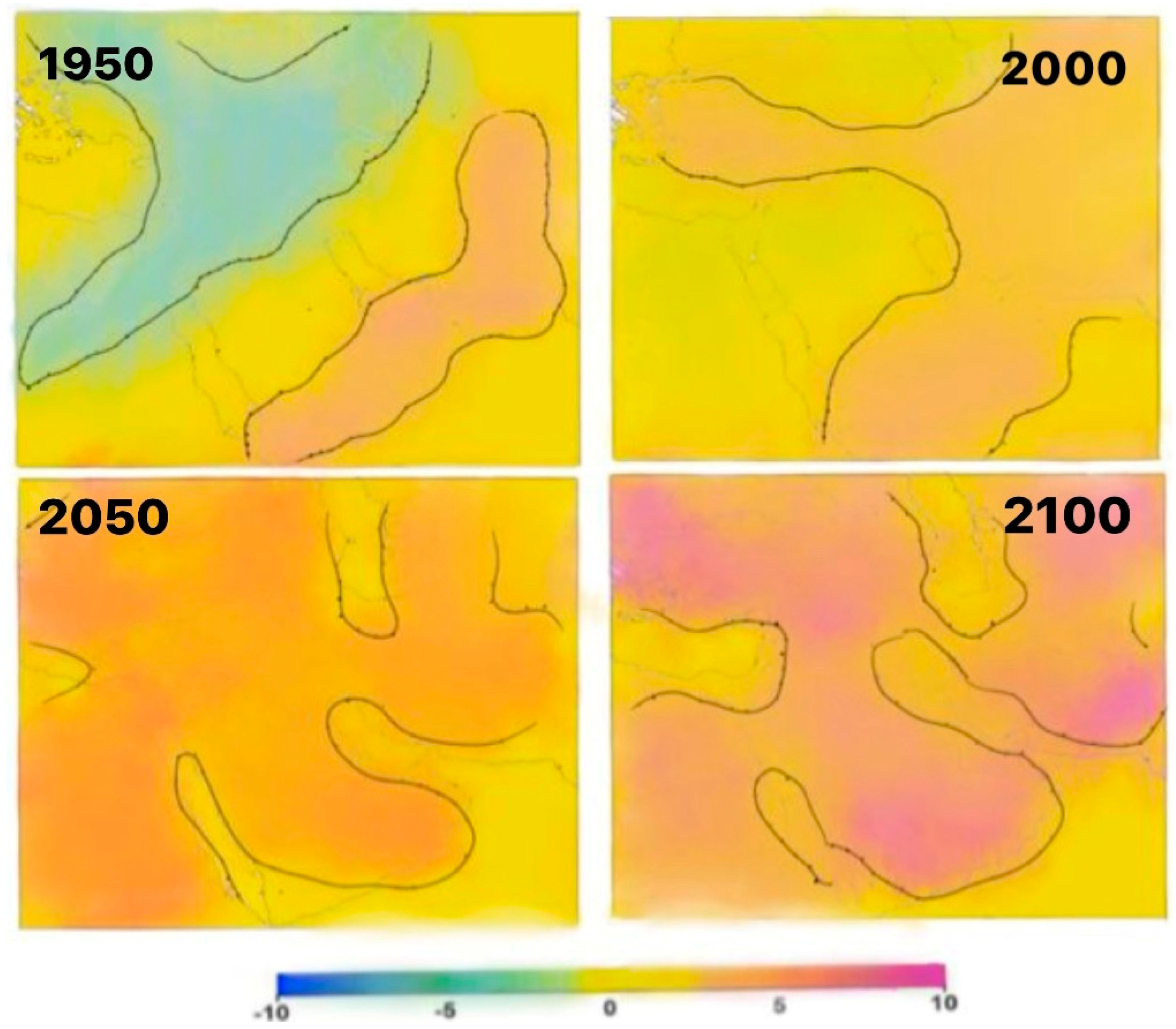
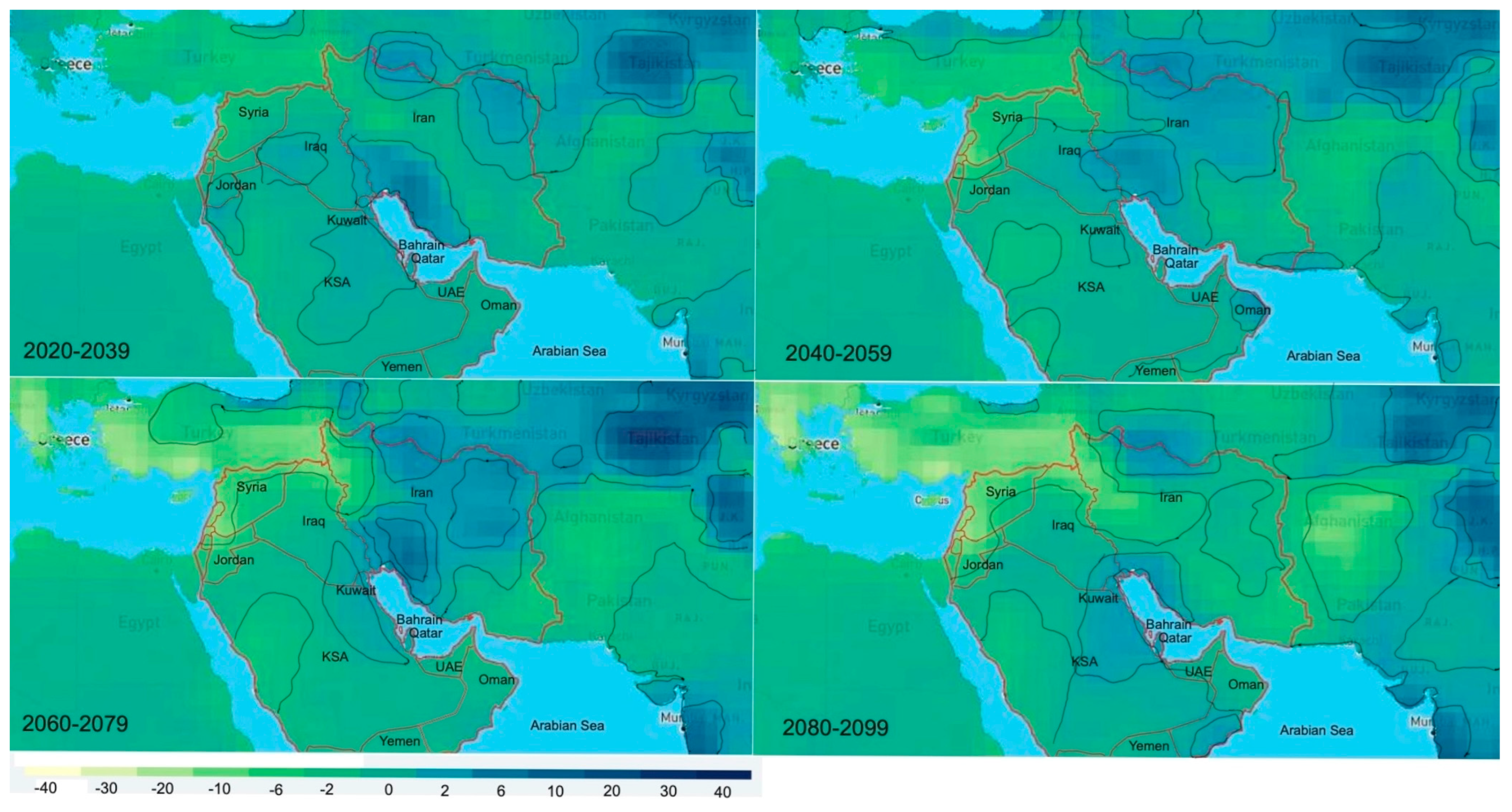
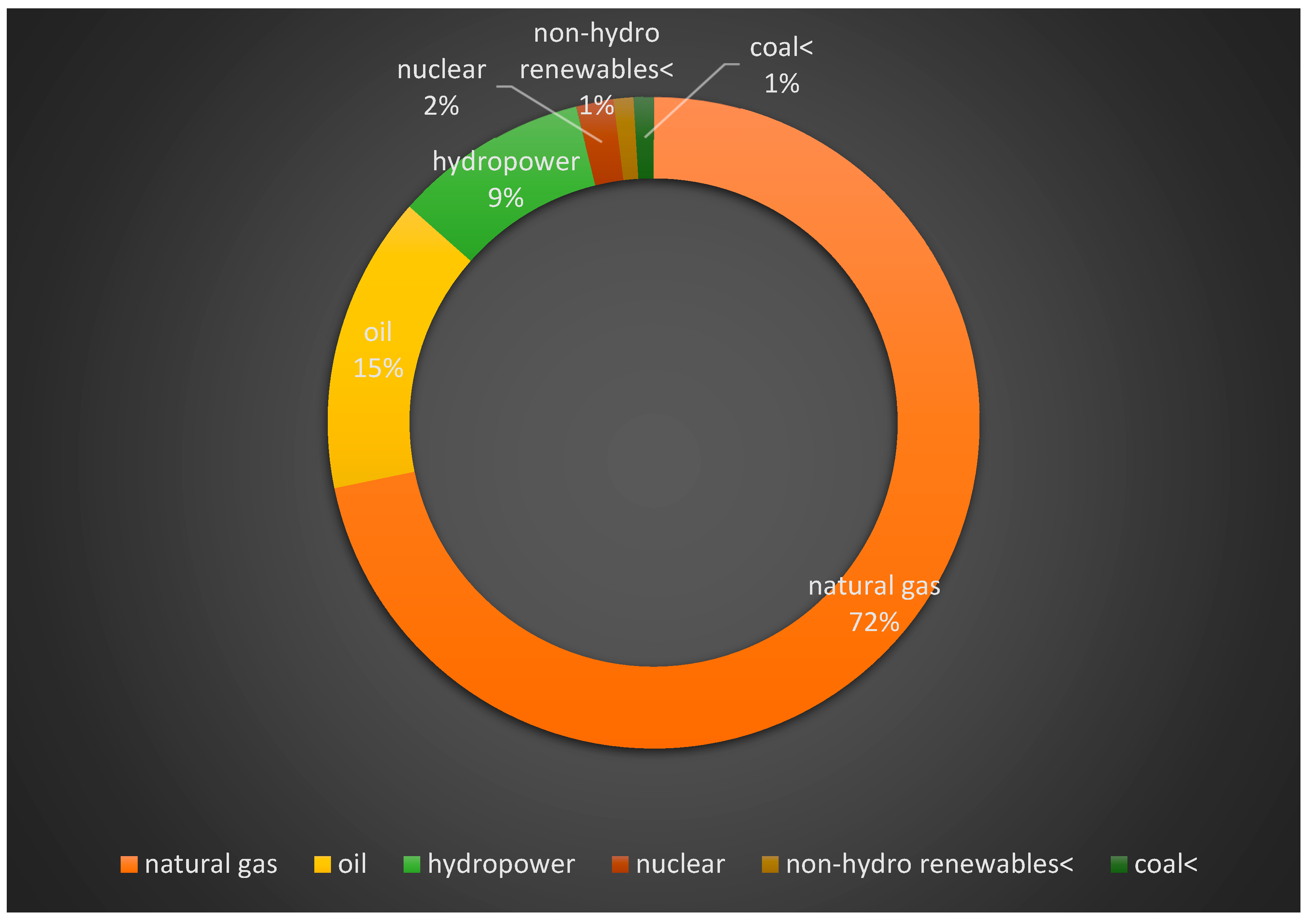
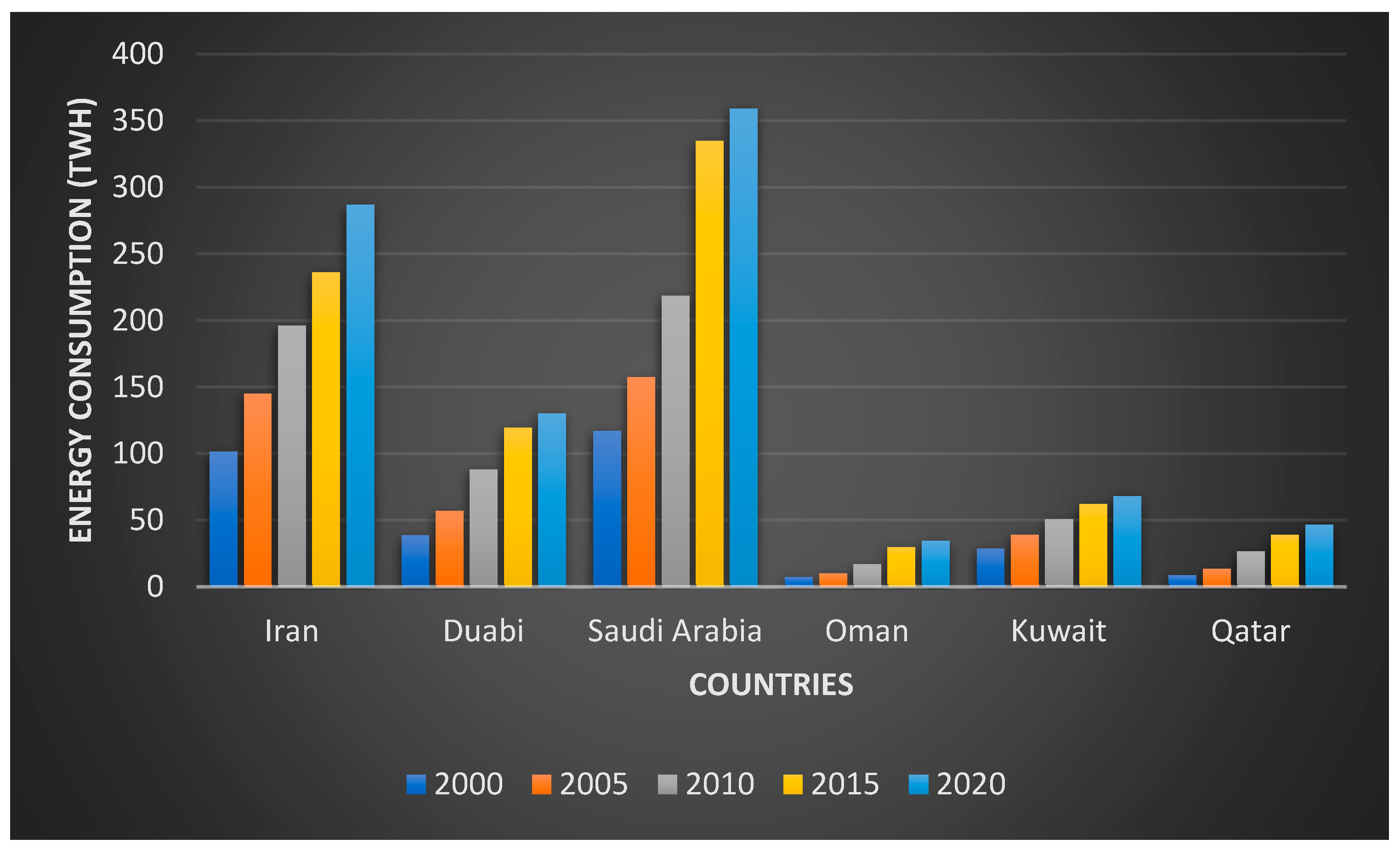
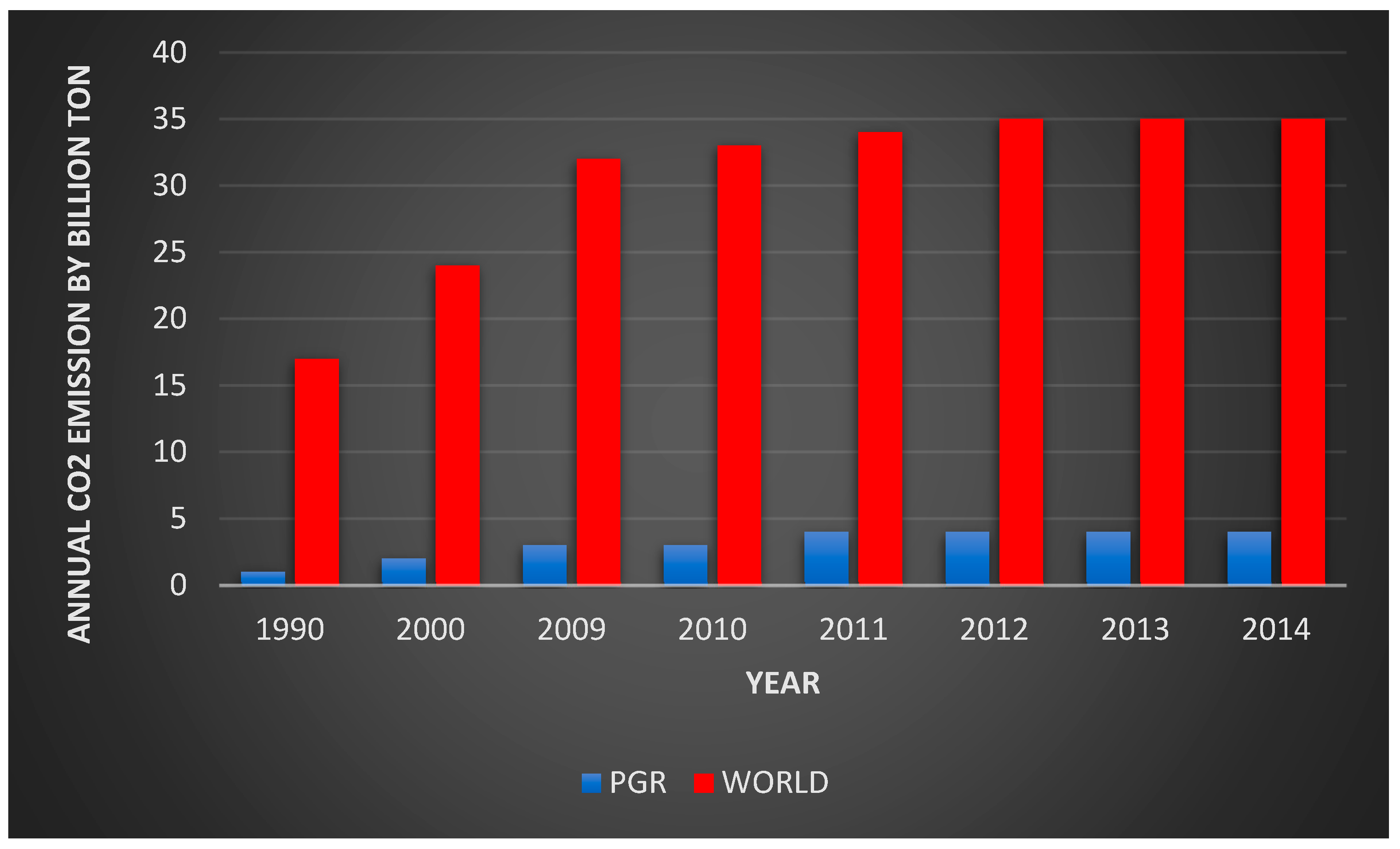
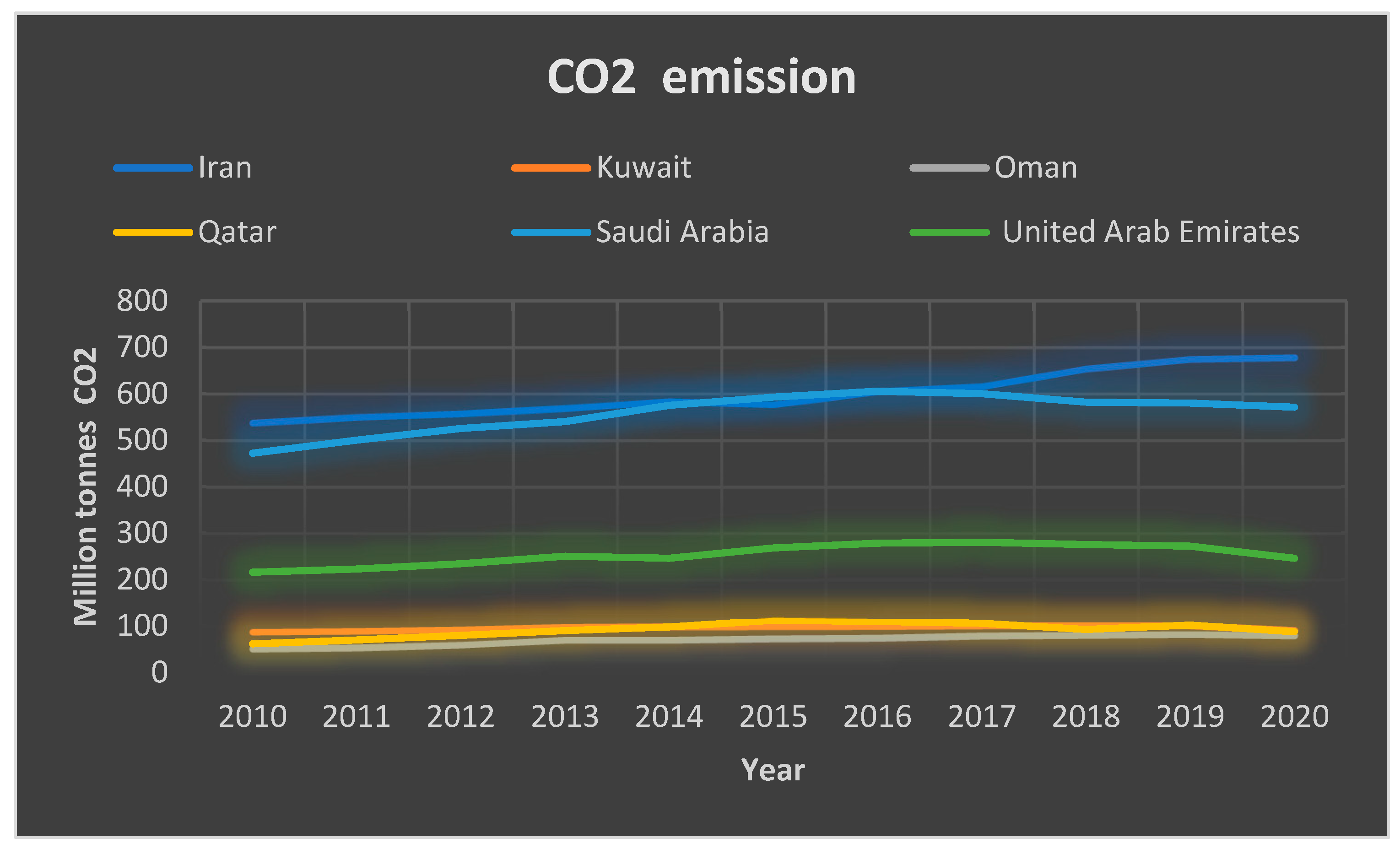
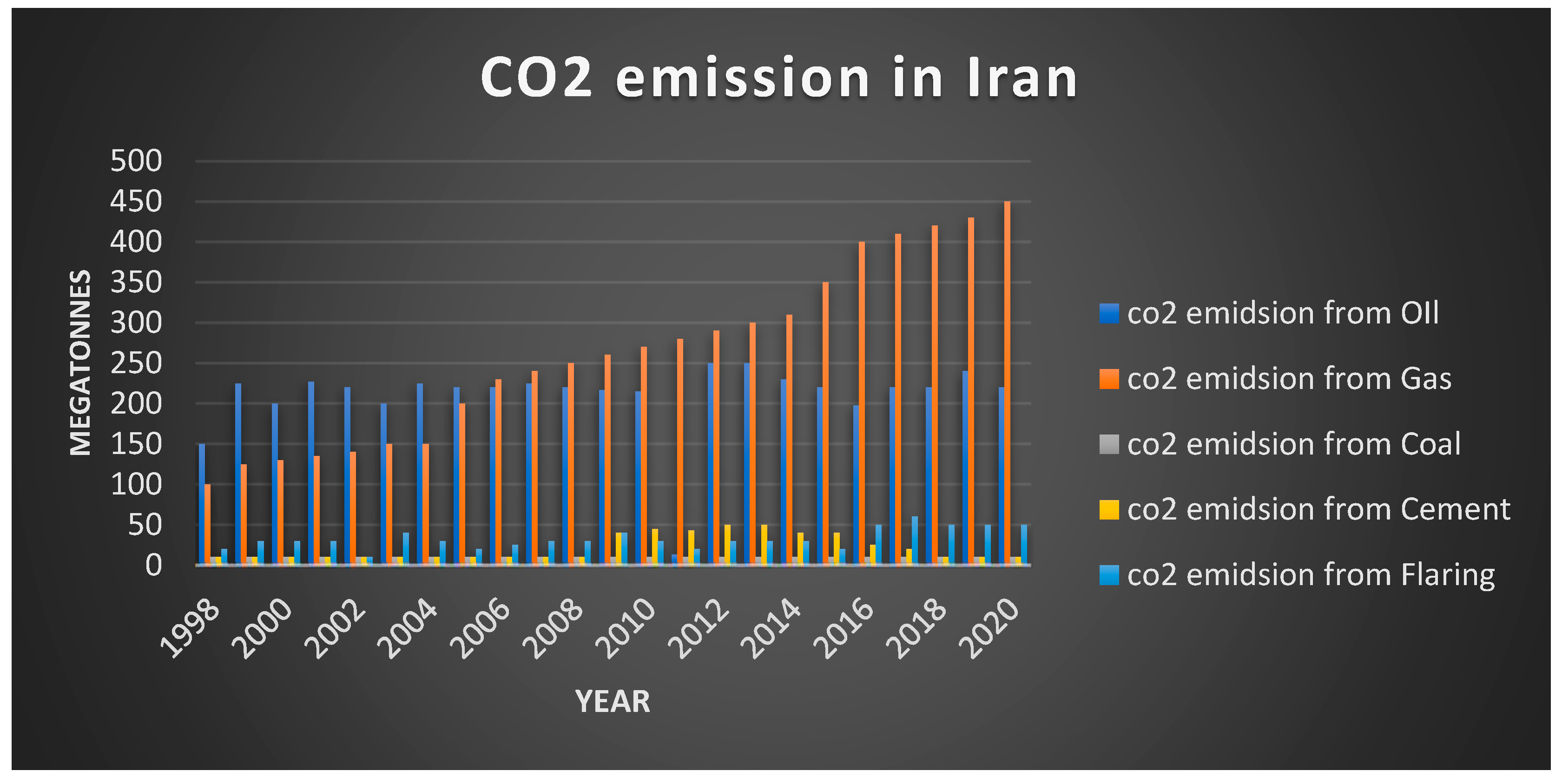
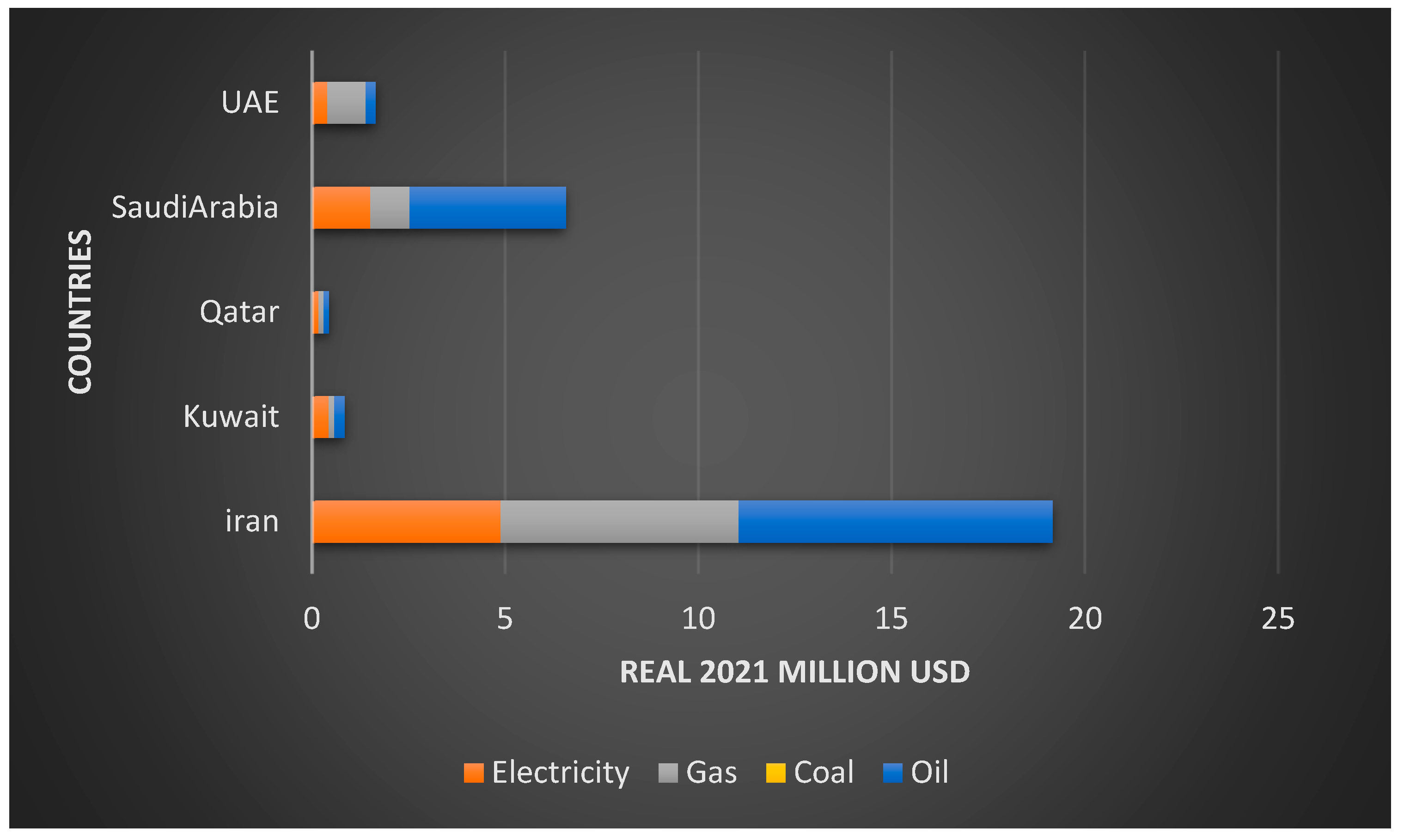
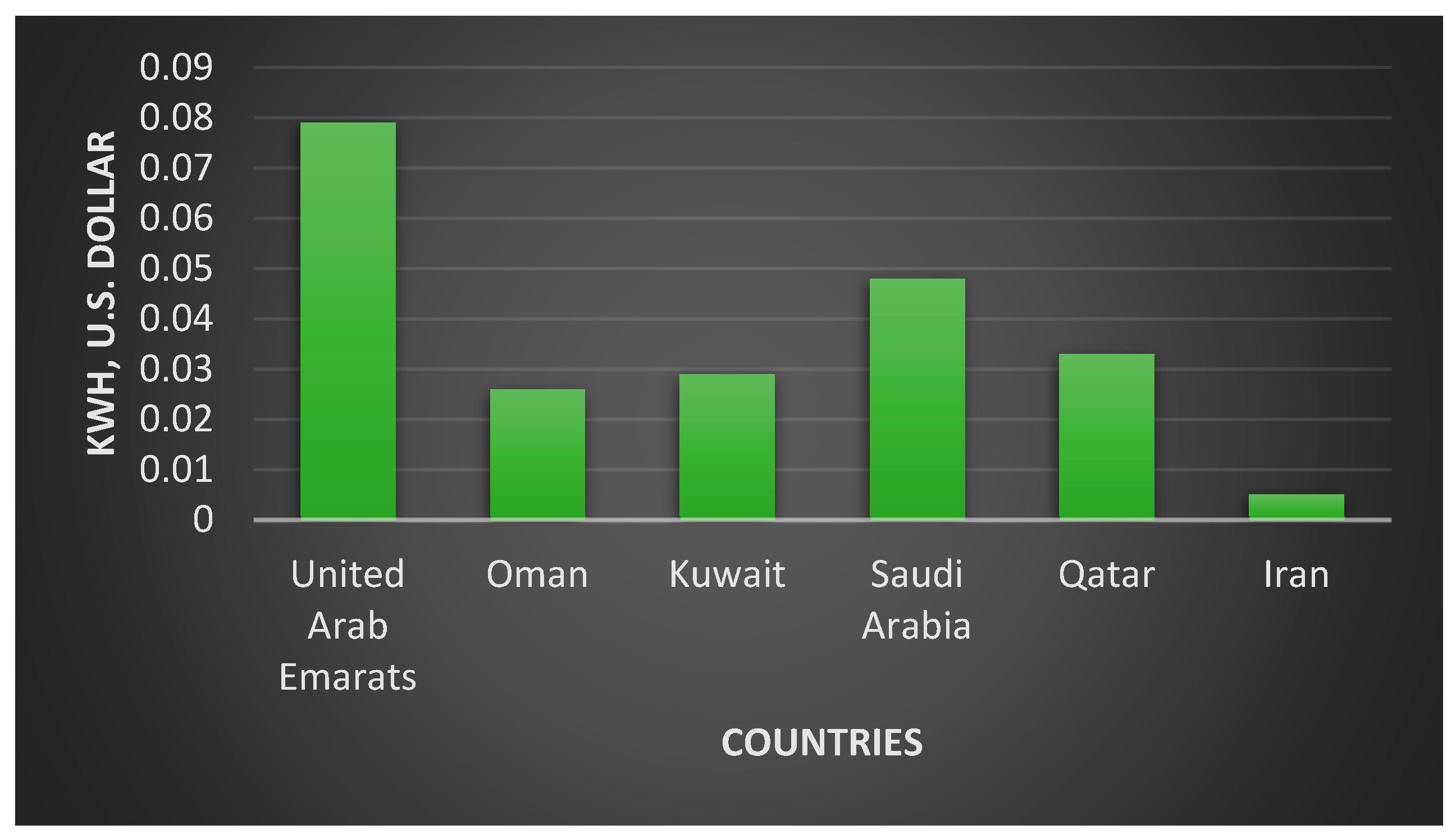
| Year | ||||||
| Dubai (UAE) | Kuwait (KW) | Ahvaz (IR) | Khasab (OM) | Jaddeh (SA) | Doha (QA) | |
| 2006 | 32.4 | 33.9 | 33 | 33.5 | 35.2 | 33.5 |
| 2007 | 32.7 | 33.8 | 33.6 | 33.6 | 35.2 | 33.5 |
| 2008 | 33.7 | 34 | 33.8 | 33.3 | 35.5 | 33.5 |
| 2009 | 34 | 34 | 33.4 | 33.7 | 35.3 | 33.7 |
| 2010 | 34.7 | 36.2 | 35 | 35.4 | 36.3 | 34.6 |
| 2011 | 34.2 | 34.1 | 33.3 | 34.5 | 34.5 | 33.7 |
| 2012 | 34.4 | 34.4 | 33.6 | 34.5 | 35.1 | 33.6 |
| 2013 | 33.1 | 30.8 | 33 | 33.8 | 34.4 | 32.2 |
| 2014 | 33.8 | 34.1 | 33.5 | 34.3 | 34.5 | 33.7 |
| 2015 | 34.6 | 34.6 | 34.3 | 35.5 | 34 | 34.2 |
| 2016 | 34.2 | 34.7 | 34.2 | 34.8 | 34.1 | 33.8 |
| 2017 | 34.9 | 35 | 35.1 | 34.4 | 33.6 | 24.1 |
| 2018 | 34.6 | 34 | 34.8 | 34.5 | 34.1 | 32.2 |
| 2019 | 34.6 | 34.5 | 34 | 29.9 | 33.9 | 33.8 |
| 2020 | 34.8 | 34.4 | 34.2 | 39 | 34.3 | 33.9 |
| 2021 | 35.7 | 35.6 | 35.9 | 32.1 | 35 | 34.8 |
| 2022 | 36.1 | 34.8 | 35.1 | 34.2 | 34.9 | 33.5 |
| Country | Mean Annual Prec (mm) |
| Iran | 223.05 |
| Qatar | 65.15 |
| KSA | 74.03 |
| Kuwait | 114.3 |
| UAE | 64.84 |
| year | Iran | Kuwait | Qatar | Saudi Arabia | United Arab Emirates |
| 2010 | 7.4 | 33 | 45 | 20 | 44 |
| 2011 | 7.6 | 39 | 44 | 21 | 44 |
| section | Share (%) |
| Transport | 16.2 |
| Energy in buildings | 17.5 |
| Energy in industry | 24.2 |
| Energy in agriculture & fishing | 1.7 |
| Unallocated fuel combustion | 7.8 |
| Fugitive emissions from energy | 5.8 |
Disclaimer/Publisher’s Note: The statements, opinions and data contained in all publications are solely those of the individual author(s) and contributor(s) and not of MDPI and/or the editor(s). MDPI and/or the editor(s) disclaim responsibility for any injury to people or property resulting from any ideas, methods, instructions or products referred to in the content. |
© 2023 by the authors. Licensee MDPI, Basel, Switzerland. This article is an open access article distributed under the terms and conditions of the Creative Commons Attribution (CC BY) license (http://creativecommons.org/licenses/by/4.0/).

